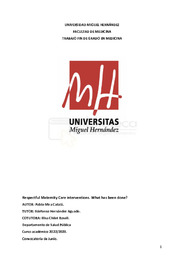Por favor, use este identificador para citar o enlazar este ítem:
https://hdl.handle.net/11000/29719Registro completo de metadatos
| Campo DC | Valor | Lengua/Idioma |
|---|---|---|
| dc.contributor.advisor | Hernández-Aguado, Ildefonso | - |
| dc.contributor.advisor | Chilet Rosell, Elisa | - |
| dc.contributor.author | Mira Catalá, Pablo | - |
| dc.contributor.other | Departamentos de la UMH::Salud Pública, Historia de la Ciencia y Ginecología | es_ES |
| dc.date.accessioned | 2023-10-19T12:12:46Z | - |
| dc.date.available | 2023-10-19T12:12:46Z | - |
| dc.date.created | 2023-05-06 | - |
| dc.identifier.uri | https://hdl.handle.net/11000/29719 | - |
| dc.description.abstract | For the last decade, there has been emerging evidence on experiences of mistreatment, disrespect and abuse (D&A) during facility-based childbirth all around the world. Women suffering any of these negative experiences during labour are at 50-60% increased odds of developing severe postpartum depression, and these have also been proven to create a barrier for seeking both facility-based childbirth and postnatal health care. This is not only a quality of care issue, but a major violation of human rights. However, only a few studies have tried specifically designed interventions to reduce them. The aim of this scoping review is to synthetise all the evidence available to that respect, identifying successful initiatives that have been taken to eradicate the mistreatment, D&A women suffer during childbirth in health facilities. Published literature was searched in PubMed, and every original study assessing the effectiveness of any kind of intervention specifically designed to reduce these negative experiences was selected. Ten articles were included in this review. The publication years ranged from 2015 to 2022, and all were located in Africa except for two, whose settings took place in Mexico and the U.S. Five did a before-and-after intervention study, 3 used mixed-methods, one was a comparative study between birth centers, and another one, a quasi-experimental study. The most common feature was including some sort of Respectful Maternity Care (RMC) training for providers at the intervention center. Every study that did so, concluded that it resulted in an improvement of the care received by the delivering women. Physical abuse was the most consistently reduced. Other strategies that only a few articles explored were open maternity days, clinical checklists, wall posters and constant user feedback. The articles reviewed indicate that there are effective interventions to reduce D&A and promote RMC for women during facility-based childbirth. Specific types of training and different initiatives complementing them should be assessed by further scientific research, and RMC interventions applying these strategies should be implemented by health institutions to assure a human rights based maternity care for women giving birth in health facilities all around the world. | es_ES |
| dc.format | application/pdf | es_ES |
| dc.format.extent | 25 | es_ES |
| dc.language.iso | eng | es_ES |
| dc.publisher | Universidad Miguel Hernández de Elche | es_ES |
| dc.rights | info:eu-repo/semantics/openAccess | es_ES |
| dc.rights.uri | http://creativecommons.org/licenses/by-nc-nd/4.0/ | * |
| dc.subject | childbirth | es_ES |
| dc.subject | postpartum | es_ES |
| dc.subject | postnatal health care | es_ES |
| dc.subject | mistreatment | es_ES |
| dc.subject | respectful maternity care (RMC) | es_ES |
| dc.subject.other | CDU::6 - Ciencias aplicadas::61 - Medicina | es_ES |
| dc.title | Respectful Maternity Care interventions. What has been done? | es_ES |
| dc.type | info:eu-repo/semantics/bachelorThesis | es_ES |

Ver/Abrir:
MIRA CATALÁ, PABLO, TFG.pdf
602,39 kB
Adobe PDF
Compartir:
 La licencia se describe como: Atribución-NonComercial-NoDerivada 4.0 Internacional.
La licencia se describe como: Atribución-NonComercial-NoDerivada 4.0 Internacional.
.png)